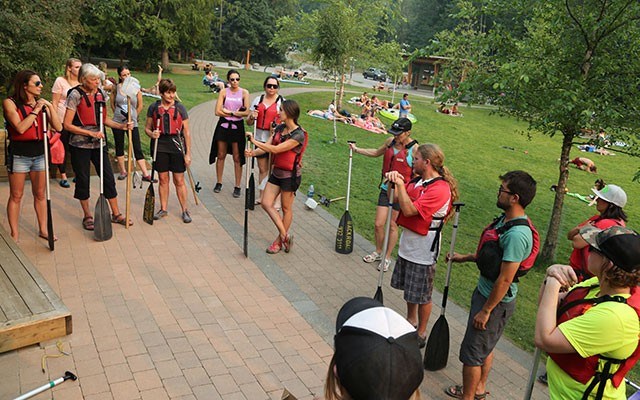Volunteers got a welcome surprise this year during the clean up of the River of Golden Dreams — less garbage.
In the past, similar efforts have resulted in hundreds of pounds of trash — from discarded float toys to broken bottles.
This year, however, the Aug. 3 event had a different outcome.
"(We found) far less garbage than what we've seen in the past," said Arthur De Jong, who runs the Whistler-Blackcomb Habitat Improvement Team (HIT), an environmental organization that spearheaded the river clean up.
The last time HIT "attacked" the river, four years ago, some 90.7 kg. of trash was removed. This time they got 36 kg.
We're seeing "much batter stewardship than what there used to be," said De Jong, who is also Whistler Blackcomb's planning and environmental manager.
Wearing wetsuits and masks, two divers plunged into the water, scooping up hard-to-reach trash — including a scarf that a creative beaver had used to build its dam.
For De Jong, who is leading the mountains' effort to dramatically improve its environmental footprint by 2030, the dearth of garbage was a welcome surprise.
"Stewardship culture has done nothing but grown (in recent years)," said De Jong.
Volunteers found golf balls, beer cans, plastic bottles, broken paddles and clothing ("both outerwear and innerwear"), said De Jong, who noted that plastic can seriously damage fish populations and eventually gets ingested by humans. "We end up eating our own waste," he said.
Eric Wight knows the river well. As owner operator of Backroads Whistler, he's been working on it for over 25 years, guiding tourists and renting kayaks.
In a show of support, Backroads lent the HIT team the vessels they used for the clean up. Wight was happy the HIT team brought divers. "Some of the debris they picked up has been there for a while," he said.
He agreed that things are better than they used to be — that there's less trash and suspects that locals are taking the clean up into their own hands. At Meadow Lake Park, where most people get out, you'll often find piles of garbage, he explained.
The river, noted Wight, is an important resource for the company, a living, breathing thing that should be cherished by the community.
When guests come to see it, they invariably "go, wow, this is almost a wilderness experience right here in the resort," said Wight.
He suggested that social media campaigns — like Escape Route's #Packitout150 Instagram contest — are making a difference.
Paul Fournier, who has volunteered with HIT on a number of restoration projects, also took part in the clean-up. The garbage, he said, damages sensitive ecosystems that are used by spawning fish.
He added that if people float down the river, they should use a certified marine vessel — not a cheap inflatable.
"There's so many sticks and obstacles and debris in the river of Golden Dreams, that (they) get punctured and lost," he said. "Anything in them... ends up in the river."
De Jong said he would like to see some "tasteful, provocative signage" to underline the importance of packing out garbage.
And while he's happy with the progress, he feels there is a long way to go.
"Is it enough? No we've just started. It's all about not having waste to start with," said De Jong.




